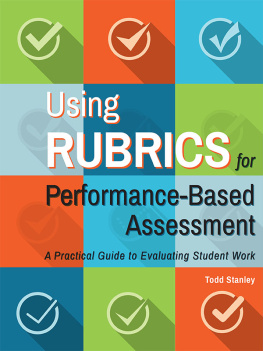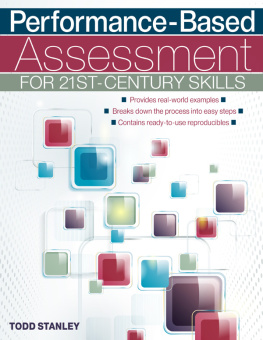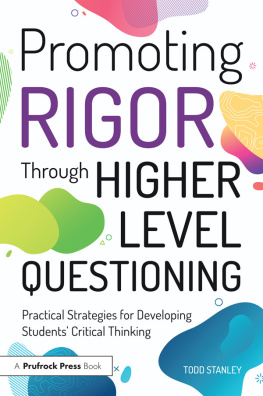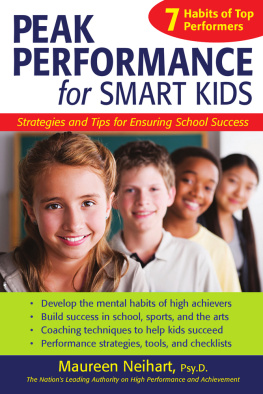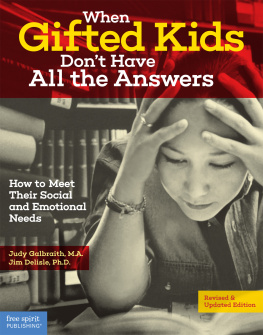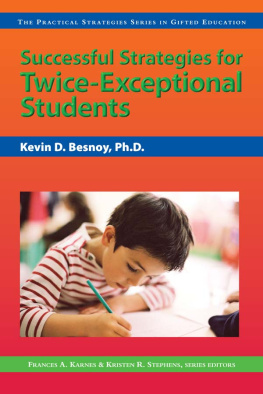


Library of Congress catalog information currently on file with the publisher.
Copyright 2018, Prufrock Press Inc.
Edited by Katy McDowall
Cover design by Raquel Trevino and layout design by Allegra Denbo
ISBN-13: 978-1-61821-705-9
No part of this book may be reproduced, translated, stored in a retrieval system, or transmitted, in any form or by any means, electronic, mechanical, photocopying, microfilming, recording, or otherwise, without written permission from the publisher.
For more information about our copyright policy or to request reprint permissions, visit http://www.prufrock.com/permissions.
At the time of this books publication, all facts and figures cited are the most current available; all telephone numbers, addresses, and website URLs are accurate and active; all publications, organizations, websites, and other resources exist as described in this book; and all have been verified. The authors and Prufrock Press make no warranty or guarantee concerning the information and materials given out by organizations or content found at websites, and we are not responsible for any changes that occur after this books publication. If you find an error or believe that a resource listed here is not as described, please contact Prufrock Press.

| Prufrock Press Inc.
P.O. Box 8813
Waco, TX 76714-8813
Phone: (800) 998-2208
Fax: (800) 240-0333
http://www.prufrock.com |
Table of Contents
Part I
INTRODUCTION
The Story of Mike
I was working with a group of fourth-grade students when I felt a vibration in my pocket. At lunch when I checked my phone, I found the following text message:
Just wanted to let you know I am joining the army.
It was from a number I did not recognize, so I texted back congratulating the person but also asking to identify him- or herself. The message came back:
This is Mike.
Mike? My Mike? Why would he be joining the army, and at age 28?
Mike and I go way backhe was a seventh grader when I was a teacher just 3 years into my career. I remember Mike coming into my class with a knit cap on that proudly displayed KISS across its brow. If it were the 1970s, this would have been appropriate, because KISS was huge then. This, however, was the 1990snot a good sign. He had a little bit of an attitude, was kind of a smart aleck, but was not anything that even a rookie teacher such as myself could not handle. This was not the case for all of his teachers, however. When our team of teachers got together to discuss how the school year was going, one of the veteran teachers complained about Mike.
He is always questioning my authority, she noted.
What do you mean questioning? I asked.
Whenever I teach a lesson, he always questions me on it. I think he is trying to make me look stupid.
Sounds to me like he is just curious.
As the year rolled on, I never had any issues with Mike being disrespectful, although he did like to ask questionssometimes relentlesslylike a machine gun firing. But they were usually an attempt to dig a little deeper and benefitted everyone in the class.
Luckily for me, we looped the students for 2 years, and I had Mike for his eighth-grade year as well. The most rewarding part about having students over multiple years, especially in junior high, is that you get to see them grow up right in front of you. They go from little kids to the young men and women they will grow up to be, both physically and mentally. I grew pleased with how seriously Mike was beginning to take his academics. I saw bright things for his future. During these 2 years, I learned Mikes father had passed away when he was just a young child. As happens to a lot of male teachers who teach younger grades, for many of the students, I was the first male teacher they ever had. Because of this, I had the added privilege of being a male role model for students, especially ones like Mike who did not have one at home. I also discovered that he was gifted across the board, testing gifted in all four subject areas as well as superior cognitive ability, meaning he was highly gifted. His questions were not meant to challenge authority; he was just naturally inquisitive.
By the time he finished his eighth-grade year, Mike had become my favorite student. I know teachers are not supposed to pick favorites, but we do, and Mike and I had a bond that was stronger than just student and teacher. A couple of years later, I was working for a humanities program that recruited juniors and seniors from local high schools to a magnet program. I went to Mikes school, and he was first in line to join. This meant another 2 years with Mike, and by this time he had matured from a KISS-wearing miscreant to a thoughtful young man who wrote poetry and played the guitar. The intelligence he had used to flummox veteran teachers had morphed into a desire to learn at a deeper level and produce amazing work.
Near the beginning of his senior year, Mike asked me to write him a letter of recommendation as he was applying to Harvard University. I was more than happy to do so and gushed about Mike and his wonderful abilities that I had the chance to witness over 4 years time. He was accepted and began attending the Ivy League school the next year. I felt as though Mike was living up to his potential and was going to set the world on fire with his accomplishments.
It was during that year on Thanksgiving that my phone rang. It was Mike. He was having doubts about being at Harvard and was having trouble finding his place there. I assured him that he was in the right place and that he would be able to accomplish so many great things if he stuck with it. He graduated from Harvard 4 years later.
At this point, Mike and I had become friends. We met for lunch one afternoon, and I asked him what he was doing with himself. He had begun working for a company that refinished basements. I wondered if he was working in the accounting department, designing their website, or even managing projects. Nope, he was just refinishing basements. Now, the world needs people to refinish their basements, but this seemed like something a kid like Mike did while in college, not after he had graduated from one of the most prestigious schools in the nation.
Over the next few years, Mike and I would occasionally get together for lunch, and each time he was still working for the basement company. Then, a couple of years went by until the text about joining the army. Dont get me wrong: Going into the army is a choice that many fine men and women make. But, with his intellectual abilities and skillset, I expected Mike to become the national Poet Laureate, a university professor, or even a high school literature teacher. But alas, we do not get to pick the pathways of our students. We can only try to prepare them for as many of those pathways as possible and hope for the best. The world is full of valedictorians working at gas stations and dropouts who run their own successful businesses.
Would I term Mike an underachiever? He certainly had the potential to be one in junior high. If he had grown too bored, not been challenged, or run into too many teachers who did not allow him to ask so many questions, he might have fallen into that category. Was he an underachiever in his job? That depends on how you look at italthough not many people with advanced abilities or degrees from Harvard work construction unless their name is Will Hunting. Were I Mikes parent, would I want more for him? Certainly. As parents we always want more for our children. The same goes for teachers and their students. Was joining the army underachieving? Again, given Mikes skillset and the life ambitions he had shared with me over the years, it did not seem like a good fit. It seemed more like the act of someone who did not know what to do with his life. As a teacher who worked with him for years, I did not believe it would use his potential to its greatest, which is what we want for every student, not just our favorites.
Next page

